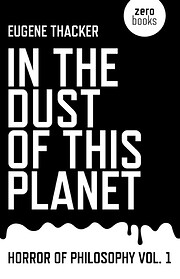

Clique em uma foto para ir ao Google Livros
|
Carregando... Thacker, E: In the Dust of This Planet (Horror of Philosophy, Band 1) (edição: 2011)de Eugene Thacker (Autor)
Informações da ObraIn The Dust of This Planet de Eugene Thacker
 Nenhum(a) Ainda não há conversas na Discussão sobre este livro.   ) )Queste le coordinate: Sistema Solare, Terra, proprio all'inizio di un'era geologica che abbiamo ribattezzato "Antropocene", riconoscendo l'uomo e le sue attività come la causa principale dei profondi cambiamenti che stanno affliggendo il pianeta. Mano a mano che la conosciamo meglio, la natura sembra piegarsi al dominio dell'uomo, perché conoscere è anche possedere. Eppure nonostante questa continua e trionfale conquista abbiamo l'impressione che qualcosa ancora ci sfugga- Più ci addentriamo nei segreti della natura, più il mondo reale ci appare alieno, inquietante e "impensabile". EugeneTacker parte proprio da qui, da questa dimensione inaccessibile al pensiero umano, per illustrarci l'unica chiave filosofica in grado di interpretarla: l'orrore. Per l'autore esistono tre gradi di esistenza del mondo in relazione all'uomo, il "mondo per noi", cioè il mondo che abbiamo già piegato al nostro dominio, il "mondo in se", quella parte del mondo che ancora non conosciamo ma che, grazie ai nostri strumenti cognitivi, potremo presto trasformare in "mondo per noi" e poi, per ultimo, il "mondo senza di noi", quella parte che sappiamo essere eternamente sfuggente all'intelletto umano, che sappiamo essere li per ricordarci che l'universo è un posto immenso, completamente indifferente alla nostra esistenza e per la gran parte impossibile da capire... solo l'orrore ci permette di realizzare l'apparente paradosso di capire qualcosa senza capirla. Il Black Metal, la demonologia, l'Orrore Cosmico lovercraftiano e l'occultismo diventano tutti strumenti di interpretazione per decodificare qualcosa a cui la razionalità, per quanto si sforzi, non potrà mai accedere. Ho letto questo libro con grande interesse, ma mi rendo conto che per molti possa essere un'opera molto complessa da affrontare... probabilmente lo sarebbe stato anche per me se prima, per fortuna, non avessi letto alcuni libri che sono solo tangenti agli argomenti affrontati in "Tra le Ceneri di questo Pianeta" ma che hanno reso molto più chiari alcuni concetti espressi nel libro. Il Primo è "[b:The Weird and the Eerie. Lo strano e l'inquietante nel mondo contemporaneo|41563228|The Weird and the Eerie. Lo strano e l'inquietante nel mondo contemporaneo|Mark Fisher|https://images.gr-assets.com/books/1535830247s/41563228.jpg|50205156]" di Mark Fisher, pubblicato da Minimun Fax in cui l'autore affronta i concetti di Strano e Inquietante a partire dalla cultura Pop come chiave interpretative del mondo moderno, e poi "[b:Iperoggetti|40237448|Iperoggetti|Timothy Morton|https://images.gr-assets.com/books/1527633020s/40237448.jpg|24903561]" di Timothy Morton edito sempre da nella collana Not, opera imponente in cui l'autore spiega il concetto di iperoggetti, ovvero oggetti così estesi nel tempo e nello spazio da essere difficilmente concepibili e pensabili da parte di un essere umano dalla vita e dalla capacità cognitiva limitata. I wanted to love this, but only just liked it sometimes. Fully owning that I don’t have much experience with many of the philosophers he cites so maybe my own ignorance affected my reading, but at times (really more often than not) it felt like Thacker was running in circles and even he didn’t quite know what point he was trying to make. The different frameworks in which he presents each section left the book poorly organized and created a disjointed feeling in the text. This book reminded me of a paper you would write in college where you forgot your thesis halfway through and threw in as many convoluted sentences as possible with some made up words that describe your non-point in an effort to hide the fact that you don’t totally know what you’re trying to say. That being said, there were some far out moments that were worthwhile, if you’re willing to work to get to them. sem resenhas | adicionar uma resenha
Pertence à série
The world is increasingly unthinkable, a world of planetary disasters, emerging pandemics, and the looming threat of extinction. In this book, Eugene Thacker suggests that we look to the genre of horror as offering a way of thinking about the unthinkable world. To confront this idea is to confront the limit of our ability to understand the world in which we live - a central motif of the horror genre. In the Dust of This Planet explores these relationships between philosophy and horror. In Thacker's hands, philosophy is not academic logic chopping; instead, it is the thought of the limit of all thought, especially as it dovetails into occultism, demonology, and mysticism. Likewise, Thacker takes horror to mean something beyond the focus on gore and scare tactics, but as the under-appreciated genre of supernatural horror in fiction, film, comics, and music. Não foram encontradas descrições de bibliotecas. |
Current DiscussionsNenhum(a)Capas populares
 Google Books — Carregando... Google Books — Carregando...GênerosClassificação decimal de Dewey (CDD)110Philosophy and Psychology Metaphysics MetaphysicsClassificação da Biblioteca do Congresso dos E.U.A. (LCC)AvaliaçãoMédia: (3.69) (3.69)
É você?Torne-se um autor do LibraryThing. |
||||||||||||||||||||||||||||||||||||||||||||||||||||||||||||||||||||||||||||||||||||||||||||||||||||||||||||||||||||||||||||||||||||||